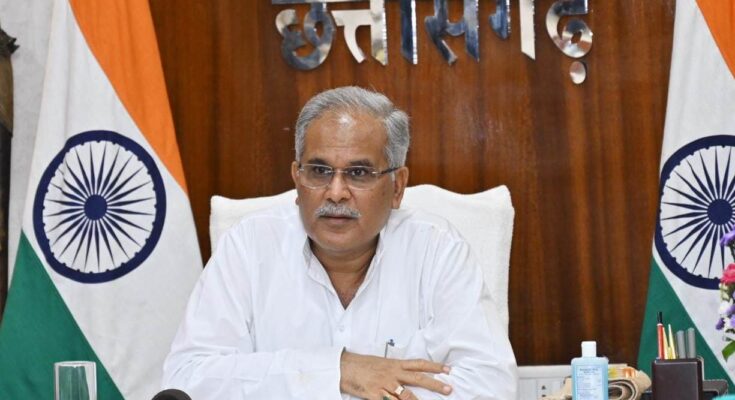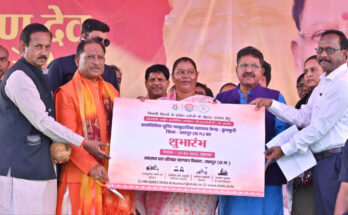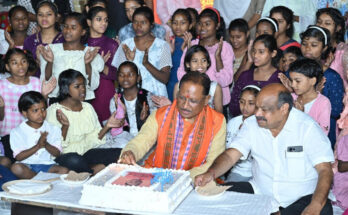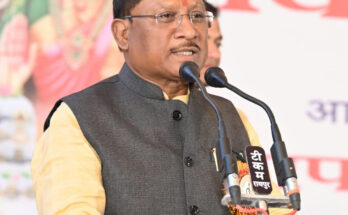India is the world’s largest democracy and emerging economic power
The division of society in the name of religion is worrying
In the inaugural session of the three-day conference organized at SOAS University of London on the topic ’75 Years A Review of India’, the Chief Minister made a virtual address.
 cChief Minister i Bhupesh Baghel has said that our freedom fighters had proved by their sacrifice and sacrifice that our unity as a nation is our biggest strength among the diversity of all castes, religions, societies. After independence, with the values with which India started its journey, we are moving ahead on the path of development by preserving and strengthening those values. These are the values which are the soul of our Constitution. Because of which, despite all the challenges, our democracy is alive. Chief Minister Bhupesh Baghel was virtual addressing the inaugural session of the conference organized at SOAS University of London today. This conference is organized at SOAS University of London to commemorate the 75th year of India’s independence from 1st August to 3rd August on the topic 75 Years of India Review.
cChief Minister i Bhupesh Baghel has said that our freedom fighters had proved by their sacrifice and sacrifice that our unity as a nation is our biggest strength among the diversity of all castes, religions, societies. After independence, with the values with which India started its journey, we are moving ahead on the path of development by preserving and strengthening those values. These are the values which are the soul of our Constitution. Because of which, despite all the challenges, our democracy is alive. Chief Minister Bhupesh Baghel was virtual addressing the inaugural session of the conference organized at SOAS University of London today. This conference is organized at SOAS University of London to commemorate the 75th year of India’s independence from 1st August to 3rd August on the topic 75 Years of India Review.
Chief Minister Bhupesh Baghel further said that today our democratic values are under threat. We are doing our part in preserving the independence of India by preserving and furthering these values. Our country is passing through a phase when questions of justice with the people have been made unnecessary and efforts are being made to harass the country on unnecessary questions. We are facing the threat of a divided society in the name of religion, it is a matter of great concern. He further said that at present the second war of freedom is being fought in the country, this fight is not a fight to get freedom, but to save it. In Chhattisgarh, we are fighting this battle with full force. After the completion of 7 decades of independence, as the Chief Minister of Chhattisgarh state, I got this opportunity to show the world what freedom meant for us through a state. What were the values of the freedom movement?
The Chief Minister said that the Constitution which we Indians have assimilated after the independence of India ensures social, economic and political equality for every citizen. He is in favor of building a democratic, secular and socialist India. But the irony is that for the last eight years, democratic institutions in the country are being demolished one after the other, secularism is being denied outright. Today is the most challenging period after independence. Democratic values are being eroded. The freedom and autonomy of the democratic institutions of the country are being destroyed.
The Chief Minister said that how far have we reached as a country in 75 years after independence. After two hundred years of slavery, we have to reflect on our journey since India became independent on 15 August 1947. Let’s see what we lost and what we found. He said that India’s economic splendor is recorded in the pages of history that in the year 1700, India’s share in the world economy was 24.4 percent, which continued to decrease during the period of slavery and when India became independent, this share had come down to 4.2 percent. . No one else has written this thing in his book by the English economist Anges Madison. Our participation in the industrial sector had come down from 25 per cent to just two per cent. We were called golden birds and when we became free, we were fascinated by every grain.
The Chief Minister said that when the country became independent, the British had guessed that we would not be able to handle it. At first they thought that we would not be able to get freedom, but we had such a great man named Gandhi, who reminded Indians what their strength is. We had hundreds of crazy people following the path of non-violence under his leadership who were ready to lay down their lives for the country. We had countless youths from Bhagat Singh to Subhas Chandra Bose who were ready to achieve freedom at any cost.
The Chief Minister said that we had a visionary leader like Pandit Jawahar Lal Nehru, who laid the foundation of a new India that today, after 75 years, we are able to say that we are the world’s largest democracy and an emerging economic power. Huh. We are everywhere, from space to Silicon Valley. We have IITs, AIIMS, IIMs and a society that has shattered the British dream that we will not be able to handle freedom.
The Chief Minister said that in order to understand the social, cultural and economic conditions of Chhattisgarh, it is necessary to know on the surface that even today there are 44 percent forests in Chhattisgarh, 31 percent of the population here are tribals, more than 80 percent of the people are farming. do farming. The culture of Chhattisgarh is forest and agriculture based culture. The people here have their own vision of development. This approach has been naturalistic rather than purely materialistic. The people of Chhattisgarh have always wanted their economic development by being a companion of nature.
Chief Minister Bhupesh Baghel said that we had promised the people of Chhattisgarh that we would fulfill the dreams of the people of Chhattisgarh following the policies of Mahatma Gandhi and Pt. Jawaharlal Nehru. Will bring the idea of village self-government to the ground. Will build a Chhattisgarh in which justice will be done to the marginalized people. We had promised to shift the axis of Chhattisgarh’s economy from cities to villages. He had promised to get the farmers and tribals the price of their sweat, to give them legal rights on water, forest and land.
We promised to make farmers more financially capable and energetic by getting them out of debt. We had promised to build a Chhattisgarh in which everyone has equal rights on education, health, food, clean drinking water and housing. MP Rahul Gandhi had put the concept of minimum income scheme in front of the country. As the Chief Minister of Chhattisgarh, here I am fulfilling that vision. The new schemes and policies that we have formulated in Chhattisgarh are in line with the ideas of Mahatma Gandhi and Pandit Jawahar Lal Nehru, fulfilling the expectations of the Chhattisgarh state building activists and the aspirations of the egalitarian society.
The Chief Minister said that under the Rajiv Gandhi Kisan Nyay Yojana, so that farmers can get the right price for their sweat, we have made arrangements for input assistance for them. Today the farmers of Chhattisgarh are getting the highest price in the country for their produce. To make Chhattisgarh a fully organic state, we are making fertilizers and pesticides by purchasing cow dung and cow urine from cattle rearing farmers under Godhan Nyay Yojana. Gothans are being developed in the form of rural industrial parks by constructing village-villages. We have started producing electricity from cow dung. Apart from this, we are also manufacturing natural paint and gulal from cow dung. We don’t want to keep our villagers just by making them consumers, but we are also making them producers.
The Chief Minister said that as our villages are developing into production centers, C-Mart has also been established in the cities for the sale of those products, where all the products of the villages are being sold under one roof. The Chief Minister mentioned about the purchase of minor forest produce, value addition and employment opportunities in the state. He spoke in detail about Mukhyamantri Haat Bazar Yojana, Chief Minister Slum Health Scheme, Dai-Didi Clinic Scheme, Dhanwantri Generic Medical Stores Scheme, Swami Atmanand English Medium and Hindi Medium School Scheme.hhattisgarh is realizing the dream of social justice and village swaraj




